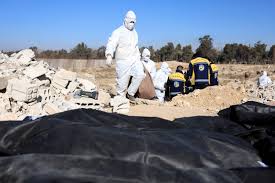Advocacy Group Claims Syrian Mass Graves May Contain Hundreds of Thousands of Bodies

The discovery of mass graves across Syria is unearthing the devastating truth about the atrocities committed under the brutal regime of the ousted dictator, Bashar al-Assad. As his government collapsed on December 8, the Syrian people, long oppressed and silenced by years of torture and fear, are now beginning to uncover the remains of their loved ones—victims of a regime that disappeared them without a trace.
For many families, the search for their missing relatives, detained by Assad’s secret police, has been an agonizing journey filled with uncertainty, grief, and unanswered questions. Now, the unearthed mass graves are providing haunting glimpses into the unimaginable suffering endured by these innocent people, but the emotional toll on their families is immense. The realization that their loved ones were tortured and buried in unmarked graves, victims of systematic state violence, has brought both sorrow and anger.
In the city of Qutayfah, a site just outside Damascus, the discovery of a mass grave has stunned many. This grave is not just a place of death—it is a symbol of the regime’s cruelty. Trenches 6 to 7 meters deep, 3 to 4 meters wide, and stretching over 50 meters long, were reportedly filled with the bodies of those who were tortured, executed, and discarded as if their lives meant nothing. Mouaz Moustafa, executive director of the Syrian Emergency Task Force (SETF), who has tirelessly worked to expose the existence of these graves, describes how gravediggers, forced to work under duress, would bury up to 600 bodies a week, hauled in by tractor trailers from various detention centers. The workers were even forced to use bulldozers to flatten the bodies to make space for more. The horror of these revelations is hard to fathom—the mass graves are not just an excavation of dirt and bones, but of the broken lives of Syrians who had once hoped for a future in their homeland.
The heart-wrenching discovery in Qutayfah is not an isolated case. Just recently, a new mass grave was uncovered north of Izraa in Daraa, where more than 20 bodies were found. Videos show men digging through dirt, pulling out bones, and uncovering covered bodies. One of the most heartbreaking aspects of these finds is that the bodies, once meticulously buried and hidden from the world, now serve as silent witnesses to a regime that inflicted unimaginable suffering on its people. The agonizing truth is that many of these victims were once hopeful, full of life—people with families, dreams, and futures that were abruptly stolen from them by an oppressive regime.
The International Commission on Missing Persons (ICMP) reports that an estimated 150,000 people are still unaccounted for in Syria, most of whom were detained or forcibly disappeared by the Assad regime and its affiliates. These numbers, however, are not just statistics—they represent the fathers, mothers, sons, and daughters who vanished without a trace. For their families, these figures are reminders of the devastating uncertainty they’ve had to live with for years. The disappearance of a loved one is not just the loss of a person—it’s the loss of hope, of closure, and of justice. Every mass grave unearthed is another painful reminder of the regime’s cruelty and the vast scale of its crimes.
One of the most tragic stories is that of Hazem Dakel, a Syrian man now living in Sweden. His uncle, Najeeb, was arrested in 2012, and his death was later confirmed by the family. Hazem’s brother, Amer, was detained in 2013, and he, too, was never heard from again. After years of waiting for answers, the family eventually learned that Amer had died under torture in Saydnaya, one of the regime’s most notorious prisons. Despite the family’s certainty about his death, the regime never acknowledged it. The Dakel family, like so many others, is caught between the sorrow of loss and the frustration of having never received any recognition for the suffering they endured. For Hazem, the fall of Assad’s regime brings a bittersweet mixture of relief and anguish. While the regime’s collapse is a victory for the people, it doesn’t erase the pain of losing his loved ones. As he reflects on the struggle that led to this moment, he says, “Yes, the regime fell after resistance and struggle, but there was sorrow—like, where are our children?”
These revelations are not only a source of grief but also a call to action. The world must now recognize the scale of Assad’s crimes and support efforts to identify and exhume the bodies of the victims, so their families can finally find closure. The U.S. State Department and the United Nations have emphasized the need for international cooperation to gather evidence, document the crimes, and provide the families with the justice they so desperately need.
As Syrians mourn, they also demand accountability. They want the truth to be acknowledged, and they want the world to understand the magnitude of the horrors they’ve lived through. For families like the Dakels, and so many others, finding the bodies of their loved ones is not just about the physical remains—it’s about reclaiming their dignity and ensuring that their stories are never forgotten. In the end, the fight for justice is not only about punishing those responsible; it’s about honoring the memory of those who were stolen from them in the dark shadows of Assad’s reign.







